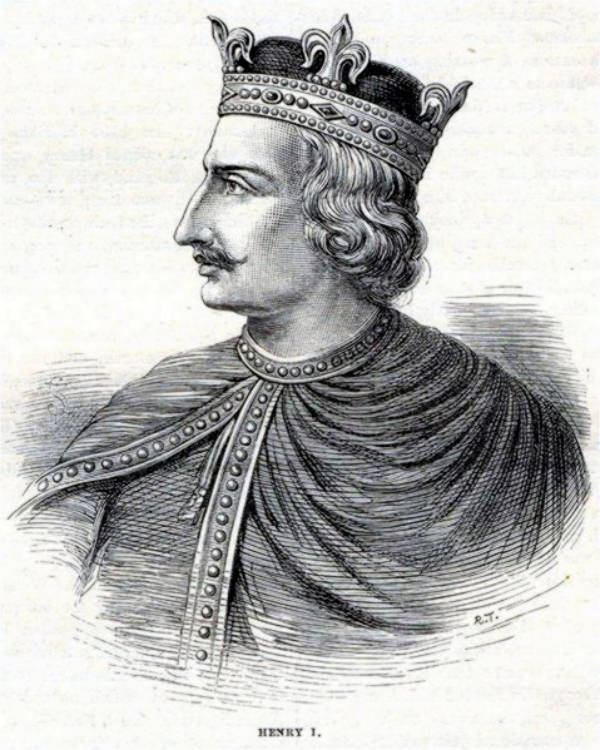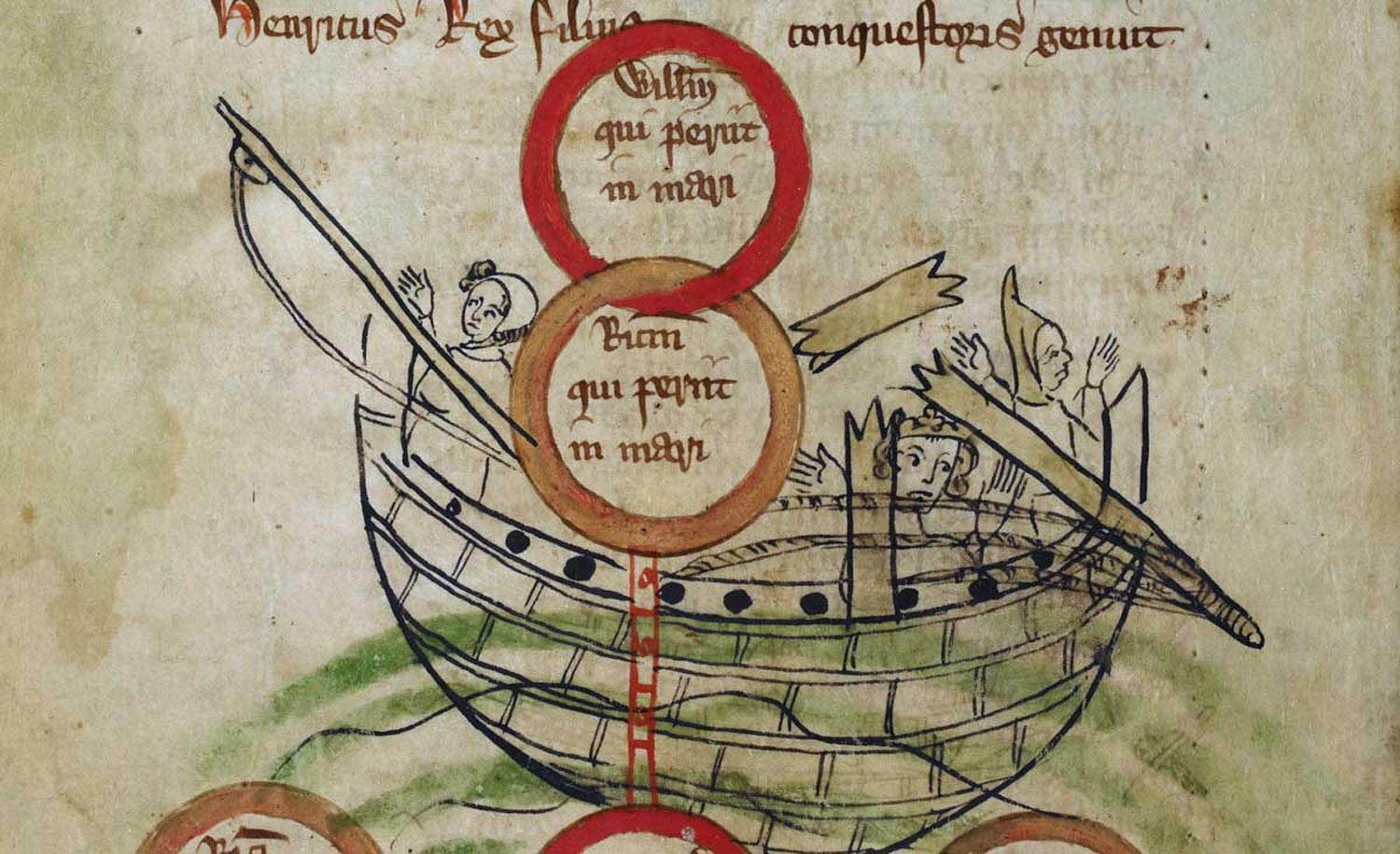The unthinkable
Henry I Part Two
This year the king of England and that of France were reconciled; and after their reconciliation all the King Henry’s own men inside Normandy and the earl of Flanders and that of Ponthieu came to terms with him. Then after this the King Henry disposed [of] his castles and his land in Normandy according to his wishes, and so went to the land here before Advent.And on this journey the king’s two sons, William and Richard were drowned - and Richard each of Chester and Ottuel his brother, and very many of the king’s court: stewards and chaimberlains and cup bearers, and various officials and countless very distinguished people along with them.
Anglo-Saxon Chronicle, Version E - Peterborough (1120)
Under any circumstances this was a disaster. Twelfth century society was accustomed to death, but outside of battle death would strike selectively as God's will was wrought one by one. To lose so many of the most well-known names in the kingdom, and to do so at once, was far rarer than a once in a lifetime event. That it was the next generation of a society desperately embedding themselves as the new establishment who carried the hopes and dreams of lasting Norman success struck home even harder. In an evening, the future itself had come undone.
What made it worse was how seemingly avoidable that evening was. A sea crossing in late November was not to be attempted lightly, but Henry and his entourage had made it without incident. They, we might assume, did not embark into a stormy night with the party still in full swing. Stephen, son of the count of Blois and a rising star in England who we will see much more of, pleaded his stomach and excused himself at the last minute. Slightly older than the others, Stephen probably realised that his common sense was worth the ribbing he knew must follow. For the others, there was no turning back. Orderic Vitalis, writing at about that time, knew that there was “too great a crowd of wild and headstrong young men” fresh from their triumph in Normandy for that. You could have seen it coming. At least one person did. And still it happened. It was a genuine tragedy.
King Henry, and many of his leading men, were back to square one.
This played to one of the main insecurities of the age. About the most important thing for an Anglo-Norman aristocrat was his patrimony - the land he (and it was a he) inherited. For many this was land in Normandy, but as their English gains started to move down the generations these were also to be preserved.
Nor were these lands safe. Henry, like his brother William Rufus, showed no great commitment to that early establishment. Orderic tells us how:
Many illustrious men were snatched from the summit of exalted power and irredeemably sentenced to the forfeiture of their inheritances; while others of lowly origin, as a reward for their obsequious services, were, so to speak, raised from the dust and exalted amongst counts and illustrious castellans and given multiple opportunities.
Orderic Vitalis
For families who took their lands at the point of a sword to lose them to Henry's government favourites could be too much to bear.

These 'new men' gained a reputation as grasping and thieving. With the free-for-all of the Norman occupation still within living memory this might sound a bit rich, but there may have been something to it. Nigel d'Aubigny, one of those new men, fell ill enough to prepare a writ to set his affairs in order. He starts one part of it with: "These are the lands which I have restored to men who were disinherited...". A decent-sized list follows.
With the king responsible for lands with no successor, wardships of minors and the marriage of female heirs, the prospect of losing your lands to one of these new men was a risk to focus the mind. That Henry himself was in a worse position than anyone did not make the feeling any easier.
After years of careful diplomatic alliances, planning and campaigning, Henry was without a legitimate heir and, as 1120 came to a close, without a queen. He had two options: father another legitimate male child or hope that his daughter, the Empress Matilda, could provide him with a grandson. Henry's new marriage to Adelaide, daughter of Godfrey count of Lorraine, was a useful alliance but did not produce an heir. In 1125 Matilda returned to England after the death of her husband, the Emperor Henry V, with the title of Empress and the airs and graces to match. But no heir.
Once again, the events of 1066 and the predicament of the childless Edward the Confessor echoed through the Norman royal family. Henry's solution was direct and extreme.
The county of Anjou was the most immediate threat to Normandy, alongside the king of France. The rivalry with Anjou was historic, intense and ingrained. The reaction when Henry agreed the marriage of Matilda to Geoffrey Plantagenet, count of Anjou, can only be imagined.
Henry then ensured that the nobility swore an oath to support Matilda and her successors.
Supporting a woman as heir was rare but quite within the realms of possibility. Matilda herself had acted as regent for Henry V in Italy. The queens of both William the Conqueror and Henry acted as regents while the king was across the water, while the wives of many leading crusaders had been left running the family business. No, in this case it was the prospect that the real power would be Geoffrey, and that Normandy and England was fall under Anjou. The alternative of Matilda herself, while theoretically preferable, was in practice scarcely a better bet thanks to her haughty demeanour.
The birth of her son, Henry, in 1133 came as a relief for the aging Henry I. It was also allowed Geoffrey to recede into the background, as Matilda would act as regent. The prospect of years of the Empress, as she still styled herself, were still deeply unappealing.
Had Henry I done enough? He had outlived his elder brother Robert (just) and Robert's son William Clito (by a little bit longer). Beyond his grandson, his only other immediate heirs were his nephews in the house of Blois, the county just east of Normandy to the south of the Ile de France. They had been close allies and the brothers Stephen and Henry of Blois were key figures at the English court.
Henry I died in 1135 after, it is said, eating too many lampreys, which were a kind of eel. Across England, Normandy, Anjou and Blois it was time to find out.
Henry I is known as much for his actions as his personality. He was stern, ruthless and persistent, but then he needed to be. At the start of his reign the Anglo-Saxon Chronicle had judged him as very much more of the same:
It is not easy to describe the miseries which this land was suffering at this time through various and manifold injustices and taxes which never left off or lessened. And always wherever the king went, there was, because of his court, wholesale raiding upon his miserable people, and with that very often burnings and slaughter of men.
Anglo-Saxon Chronicle, Version E (1104)
The Chronicle's view at the end of his reign was quite different:
He was a good man and was held in great awe. In his time no man dared do wrong against another; he made peace for man and beast; no man dared say anything but good to whoever carried their load of gold and silver.
Anglo-Saxon Chronicle, Version E (1135)
Royal power shines out from this, and with good reason. Henry had not changed that much at all. This was written afterwards - not a look back but a comparison with what was to come.
Bibliography
- Clanchy, M.T. (1983) England and its Rulers. London, Fontana
- Poole, A.L. (2nd edition, 1954) Domesday Book to Magna Carta. Oxford, Oxford University Press
- Mynors, R.A.B. (vol 1 only), Thomson, R.M., Winterbottom, M (editions vol 1 1998; vol 2 2002) William of Malmesbury's Gesta Regnum Anglorum. Oxford, Oxford University Press

